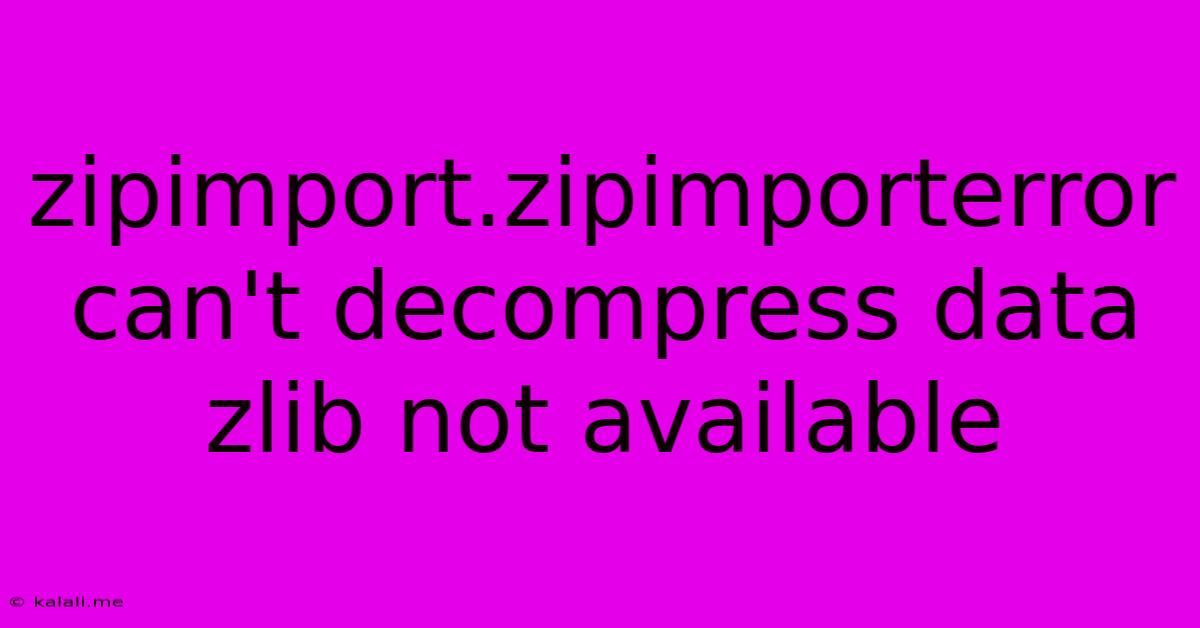Zipimport.zipimporterror Can't Decompress Data Zlib Not Available
Kalali
May 29, 2025 · 3 min read

Table of Contents
ZipImport.ZipImportError: can't decompress data; zlib not available – Troubleshooting and Solutions
The error message "ZipImport.ZipImportError: can't decompress data; zlib not available" in Python indicates a problem with importing modules from a zip archive. This usually stems from a missing or improperly configured zlib library, which is crucial for decompressing the zipped files containing your Python modules. This article will guide you through understanding the error and implementing effective solutions.
Understanding the Error
Python's zipimport module allows importing modules directly from zip archives, offering a convenient way to package and distribute your applications. However, zip archives often employ compression algorithms, most commonly zlib, to reduce file size. If zlib is unavailable or improperly installed, zipimport cannot decompress the necessary files, leading to the error.
Causes of the Error
- Missing zlib library: The most common cause. zlib is a fundamental compression library, and its absence prevents Python from decompressing the zip archive.
- Incorrect zlib installation: Even if installed, an incomplete or corrupted zlib installation can result in the same error.
- Incompatible zlib version: A mismatch between the Python version and the zlib version can cause issues.
- Operating System Issues: Problems with your OS's package manager might prevent proper installation or linking of the zlib library.
- Permissions issues: Insufficient permissions might hinder access to or modification of the zlib library files.
Solutions to the Error
Let's outline various approaches to resolve the "ZipImport.ZipImportError: can't decompress data; zlib not available" issue. Remember to adapt these solutions to your specific operating system.
1. Installing or Reinstalling zlib:
This is the primary solution. The precise commands will vary based on your system:
-
Linux (using apt):
sudo apt-get update sudo apt-get install zlib1g-dev -
macOS (using Homebrew):
brew install zlib -
Windows: If you're using a Python distribution like Anaconda, use its package manager (conda):
conda install zlibOtherwise, ensure zlib is included in your Python installation or use a package manager like pip (though zlib is usually system-dependent on Windows).
2. Checking zlib Installation:
Verify if zlib is correctly installed by attempting to import it directly into a Python interpreter:
import zlib
print(zlib.version)
If this throws an error, the zlib library is either missing or improperly configured.
3. Reinstalling Python:
In some cases, a faulty Python installation can be the underlying problem. Reinstalling Python might resolve any discrepancies or conflicts with zlib. Remember to back up your existing Python projects before doing so.
4. Ensuring correct Python Environment:
If you are using virtual environments, verify that you’ve installed zlib within the activated environment. Activate your environment before installing zlib using pip or conda.
5. System-Level Issues:
Rarely, deeper system-level issues might interfere with zlib. Try restarting your system to rule out transient problems.
6. Permissions issues:
If you encounter permission issues, consider running the installation commands with administrator or root privileges (using sudo on Linux/macOS).
Preventing Future Issues
- Use a reliable Python distribution: Using established distributions like Anaconda or Miniconda often simplifies dependency management and reduces the chances of encountering such errors.
- Use virtual environments: Isolate your projects to avoid conflicts between different packages and their dependencies.
- Keep your system updated: Regularly updating your operating system ensures that necessary libraries are up-to-date and properly configured.
By systematically working through these solutions, you should be able to resolve the "ZipImport.ZipImportError: can't decompress data; zlib not available" error and successfully import modules from your zip archives. Remember to choose the solutions relevant to your operating system and Python installation method.
Latest Posts
Latest Posts
-
Como Edcir Casa De Mner Despectiv
May 30, 2025
-
How To Clean Jets In Tub
May 30, 2025
-
Remove Number From End Of Variable Values R
May 30, 2025
-
How To Find Old Passwords On Iphone
May 30, 2025
-
Would That It Only Make You Happy Meaning
May 30, 2025
Related Post
Thank you for visiting our website which covers about Zipimport.zipimporterror Can't Decompress Data Zlib Not Available . We hope the information provided has been useful to you. Feel free to contact us if you have any questions or need further assistance. See you next time and don't miss to bookmark.